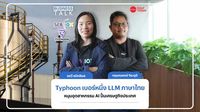Artificial Intelligence (AI) is no longer a concept of the future; it is the backbone of modern business, providing a competitive edge that companies cannot afford to ignore. This was the central theme at the Google Cloud Next 2025 event, held from April 9 to April 11, 2025, in Las Vegas, USA. The conference showcased the evolution of AI technology and its transformative impact across various industries.
During the opening keynote on April 9, Sundar Pichai, CEO of Alphabet, Google's parent company, outlined the significant trends in AI that are poised to reshape business operations. "Google has invested in AI for over a decade, seeing it as the most critical pathway to enhance our mission of organizing the world's information and making it universally accessible and useful," Pichai stated. He emphasized the vast opportunities that AI presents, which is why Google is committing approximately $75 billion (around 2.5 trillion baht) to AI-related businesses, including essential infrastructure like the Cloud Wide Area Network (Cloud WAN).
Cloud WAN is designed to operate at 'Google speed' with nearly zero latency, serving billions of users worldwide. Pichai noted that this service will enable organizations to maximize network performance by up to 40% while reducing overall network ownership costs by the same margin. Currently, Cloud WAN spans 42 locations globally, with new sites being added in Sweden, South Africa, and Mexico, alongside expansions in Kuwait, Malaysia, and Thailand, interconnected by over two million miles of undersea and terrestrial cables.
Thomas Kurian, CEO of Google Cloud, echoed Pichai's sentiments, stating, "What best reflects our success is not just the technology itself, but the tangible results from our customers' business transformations." Google Cloud presented success stories from over 500 clients across both public and private sectors, including notable names like Honeywell, L’Oréal Groupe, McDonald’s, and Samsung, showcasing measurable outcomes from their AI implementations.
AI is indeed revolutionizing numerous sectors. For instance, McDonald’s efficiently serves 65 million customers daily through cloud computing, managing everything from queue systems to food quality control. However, as AI simplifies many tasks, some industries still grapple with challenges, particularly in media, where businesses must adapt to AI's capabilities in content creation.
AI tools are delivering real results for customers. Agoda, a leading digital travel platform, utilizes Imagen and Veo on Vertex AI to produce stunning images and videos of various travel destinations, significantly boosting customer engagement and bookings. Similarly, Bending Spoons, a well-known app developer, employs Imagen 3 in its photo-editing application Remini, processing up to 60 million images daily. Kraft Heinz has leveraged AI to drastically reduce marketing campaign creation times from eight weeks to just eight hours.
Moreover, Google Cloud is ushering in a new era of AI Agents that are set to transform business workflows. These advanced agents are not only capable of coding and data analysis but are also revolutionizing customer experiences and content creation within organizations. For example, Customer Agents enable faster responses to customer inquiries by analyzing data from various formats—text, voice, images, and video—and communicating in a human-like manner, whether through web interfaces, devices, or even in vehicles.
AI's impact is evident as Globo has doubled the video click-through rates on its platform, while DBS has reduced customer service processing times by up to 20%. Wendy’s utilizes an AI-driven system for drive-thru orders, handling over 60,000 transactions daily, and Mercedes-Benz enhances the driving experience with voice search capabilities.
Creative Agents are also making waves in content creation, assisting teams in developing marketing campaigns and creative designs more efficiently. Adobe has collaborated with Google AI to integrate Imagen 3 and Veo 2 into Adobe Express, further enhancing creative workflows.
In addition to these advancements, Data Agents facilitate easier data management, allowing organizations to prepare, analyze, model, and retrieve information through natural language processing. Spotify employs BigQuery to analyze data from 675 million users, while Bayer utilizes Google Trends data to forecast crop yields.
As AI continues to evolve, its role in business is becoming increasingly critical. Companies that fail to embrace AI technology risk falling behind, as the competitive landscape shifts towards those who leverage these innovations effectively. The Google Cloud Next 2025 event not only highlighted the potential of AI but also served as a clarion call for businesses to adapt to this rapidly changing environment.
On the other side of the AI landscape, the development of a Thai language large language model (LLM) named Typhoon is gaining traction. As many are familiar with AI chatbots like ChatGPT, Typhoon aims to cater specifically to the Thai context, enhancing the AI experience for local users.
Arvie Smitthi, Developer Relations Manager at SCB 10X, shared insights into Typhoon's creation, emphasizing its open-source nature, which allows developers to build upon it and create tailored AI solutions for various industries. With over 400,000 downloads and more than 21 million API calls, Typhoon is positioned as the leading Thai language model in the market.
"The importance of Typhoon lies in its open-source system, which means we do not hoard knowledge; instead, we empower developers to create their own AI solutions," Smitthi explained. She highlighted that using a locally developed model keeps financial resources within the country and supports the growth of Thailand's digital economy.
Typhoon's roadmap includes making the model more accessible, with plans to improve its capabilities beyond text to include audio and image processing. Kritpong Jirayu, Program Manager at SCB 10X, emphasized the need for Typhoon to understand Thai culture and language nuances, enabling users to interact with it as if they were conversing with a Thai person.
Typhoon's applications extend beyond the fintech sector, with examples in law and healthcare. The Vitayasiri Institute has developed a legal chatbot named Sumhai, capable of answering legal inquiries based on comprehensive business law databases in Thailand. In healthcare, Siriraj Hospital employs a chatbot for its innovation center to field questions, enhancing efficiency and accessibility.
As Typhoon continues to develop, it represents a significant step forward for Thailand's AI industry, enabling local enterprises to create their own AI solutions tailored to their unique needs. Interested parties can learn more about Typhoon at https://opentyphoon.ai.





